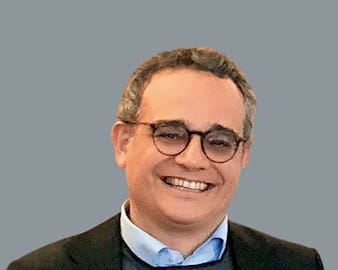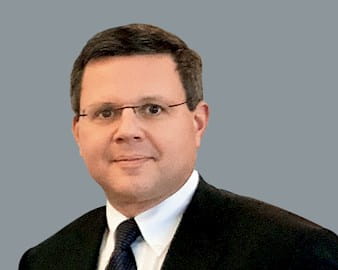
A unique partnership between Chicago Booth and Oxford Saïd Business School is enhancing private equity education for students, executives, and alumni.
- By
- May 01, 2018
- Private Equity

When Andreas Angelopoulos, ’02 (EXP-7), became executive director of the Private Equity Institute at the University of Oxford’s Saïd Business School, he knew he wanted to capitalize on the combined brainpower of his alma mater and his new employer.

With the support of Booth leadership and key faculty members, Angelopoulos has developed a triad of private equity–related programs under the Oxford Chicago banner: the Oxford Chicago Global Private Equity Challenge for the students, the Oxford Chicago Valuation Program for executives and alumni, and the Oxford Chicago Discussions for students and alumni.
To make the programs successful, Angelopoulos called on graduates such as Nick Alexos, ’88, who cofounded Chicago-based private equity firm Madison Dearborn Partners LLC and is now executive vice president and CFO of York, Pennsylvania-based dental products manufacturer Dentsply Sirona Inc. We spoke with Angelopoulos and Alexos about the one-of-a-kind relationship between the two B-school titans.
Chicago Booth Magazine: What motivated the Oxford Chicago programs?
Angelopoulos: My thought process was that Oxford is unsurpassed in branding in EMEA and Asia, and Chicago Booth is the No. 1 university in finance in the United States, so let’s combine forces. It was a great thing for Oxford and a great thing for Chicago. Chicago becomes affiliated with one of the oldest and best universities in the world, based in Europe, where Booth wants to grow and expand its brand.
Alexos: For me, there are really only a handful of top MBA programs in the world. Oxford Saïd is one, and obviously Chicago Booth is another. The opportunity to have students and alumni from these programs interact is limited. This is one of the few, unique instances where you have pretty extensive involvement between two MBA programs, as well as executive education.
CBM: What are the benefits to students who participate in the Oxford Chicago Global Private Equity Challenge, a case-study competition for students that alternates annually between Oxford and Chicago?
“Oxford and Chicago are the leading schools in private equity research, education, and networking, and they are leading the way together.”
— Andreas Angelopoulos
Alexos: The essence of the Global Private Equity Challenge is to see which team identifies the best LBO opportunity: What do you pay for something, whether it’s a company or a product? All the factors that go into trying to determine the right valuation for a business are hugely complicated. I’ve served on the judging panel, and we hear students with very different perspectives effectively competing for the pride of trying to show that they have superior information, on either public or private companies. They’re trying to justify why somebody should make an investment in their business versus another opportunity.

In addition to the competition itself, the Global Private Equity Challenge provides a unique opportunity for Chicago Booth students to speak with students from Oxford Saïd, and vice versa. Oxford Saïd is global and has many international students who bring with them their own unique perspectives and experiences: for example, witnessing 150 percent inflation, or political upheaval being the standard in your life. That’s not something many of us often deal with.
Angelopoulos: It’s also unique for the Oxford University students. They visit Chicago and see how the US industry works and how students in the United States and Chicago are thinking. They can see the dynamics, the energy of the country. They are privileged, these students, to get an experience in private equity that no one else gets from two parts of the world and gain exposure to new trends. By the end, we see students from both schools demonstrating the skills that they learn through this competition.
CBM: This is the fifth year of the Oxford Chicago Valuation Program, an intensive, one-week Executive Education course that teaches participants how to apply valuation to strategic corporate and private investment decisions. Why was there a need for it?
Angelopoulos: It’s connecting theory with practice. Most MBA courses have a strong academic, theoretical element, but there are no other business schools offering something like this. We have three faculty members and 15 senior investment and finance professionals—alumni of the course—bringing their knowledge to bear. The students are executives from pension plans, private bankers, asset managers, and portfolio managers from all around the world.
“Brands can develop globally and become emblems. I think this is an emblem.”
— Nick Alexos
Alexos: What Andreas insists on from the professionals, as well as the academics, is that they present real, current materials from recent deals. At the one-week program that I attended a few years ago, there were very experienced bankers from London and private equity folks who were talking about things they had done and dynamics they had dealt with. That’s an important issue because the world is changing all the time. Deals have become much more complicated. Processes have become much quicker.
CBM: The third program is the Oxford Chicago Discussions, a discussion series with alumni that has been held in Chicago, New York, Oxford, and London. What’s your goal for these conversations?
Angelopoulos: The discussion series engages our alumni and connects both schools with our alumni. That means we’re inviting people, like Nick, who will discuss a specific topic or case, the issues that they face, and new trends. It’s a platform. It’s a place where people can meet. They can connect and interact intellectually around these important topics, like they did at our most recent past event this March in Paris.
CBM: Andreas, you continue to run the Oxford Chicago Programs at Oxford Saïd’s Private Equity Institute, in parallel with your professional activity in private equity these past years, and Nick, you spent the past 30 years working in private equity. How well are top business schools preparing students for private equity work following business school?
Angelopoulos: Oxford and Chicago are the leading schools in private equity research, education, and networking, and they are leading the way together. For example, Steve Kaplan, Neubauer Family Distinguished Service Professor of Entrepreneurship and Finance, and Oxford Saïd professor Tim Jenkinson won the 2016 Harry Markowitz Award for research along with Robert S. Harris at the University of Virginia Darden School of Business for their paper comparing the merits of investing in private versus public equity. Chicago Booth and Oxford Saïd are very strong; it’s a great combination globally. We are probably the strongest educational offering in the world at an executive-education level and at a program level. The students acquire what they need to instantly start their careers in private equity.
Alexos: Private equity is a combination of two things: basic academic rigor and the entrepreneurial element. Within Booth MBA programs, there are lots of components to build skills that are important in private equity. After the MBA program, resources such as the Polsky Center for Entrepreneurship and Innovation and the Oxford Chicago programs are just good ways for people to network and hear what other people are doing.
CBM: Do you think the Oxford Chicago programs are helping to spread the Booth brand throughout Europe?
Angelopoulos: Oxford has more than 30,000 alumni in London, and Saïd alumni are dominating the investment banking, asset management, and private equity industry in Europe. That means there’s a lot of exposure. The Oxford Chicago programs are connecting Chicago Booth with the No. 1 university in finance in Europe. They will reinforce and expand Chicago Booth’s strong brand in EMEA and Asia.
Alexos: The programs are a valuable conduit for alumni and even for the professors to be exposed to things that are going on in different parts of the world. Brands can develop globally and become emblems. I think this is an emblem. In addition, I would agree with Andreas that these programs represent an opportunity for a university-wide outreach, much as the Polsky Center does.